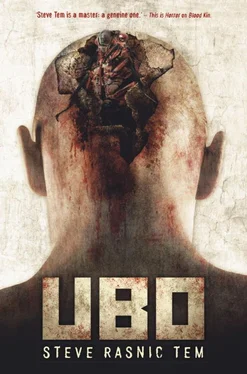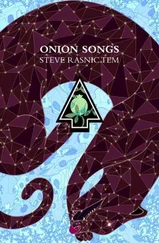Danielbot didn’t complicate things by talking about how he was still seeing bits and ghosts of scenarios. The Ubo computers apparently had some power, perhaps from an independent source.
As reluctant as he was to lie down and remain still given what was happening to some of the others, it was clearly important to conserve power.
He had noticed that the roof had changed since the first time he’d come up here. It appeared slightly barren in comparison. A great deal of the old furniture was gone, perhaps tossed off the side by agitated bots after they were forced up here, or removed by the guards for security or safety purposes. He’d been aware of frantic activity around him that first day of their rooftop exile, but he’d been oblivious to much of it. He’d been too busy adjusting to this new sense of self, and missing the life he’d mistakenly thought he had.
There were still places to find shelter if the guards allowed it, even with a couple of hundred or so bots—more than he had ever before seen together at one time. Given how many had died, or had been gotten rid of, the population of Ubo must have been much larger than he ever knew.
This massive roof easily held them all. This field of gravel and discarded bits and old ruin went on forever.
He lay down for a while, his head propped up against some bricks, gazing across this roof which at times resembled an abandoned beach, at times a battlefield, depending on the temporary visions bleeding from his head into everything he saw. Flanders Fields, Waterloo, Stalingrad, or Gettysburg, the thousands still buried beneath the battlefields of the Somme, the millions buried one upon the other all across Europe—it was hard to believe there could be enough dirt to contain them all, everyone who had once lived and breathed and sung and loved. And now out of reach. Yet he hadn’t been one of them or even descended from one of them—all he’d ever been designed to do was observe. It was the worst injustice he could imagine.
The fields at Majdanek, at Auschwitz-Birkenau, at Płaszów, everywhere a concentration camp had been: now so peaceful. He could hear the birds sing, and some distant farmer’s call for a wayward cow. He realized then he hadn’t heard a bird since he’d been in Ubo, not even seen one. Was it possible they were all extinct? He hoped not, but maybe they were in some safer place where birds were better appreciated.
“Daydreaming again? Should a robot daydream?” He looked up—Leninbot was back, hovering. “I was afraid at first you might have died, run out of power. We’ve lost at least a dozen of our kind that way, by my count. It’s murder, you know, to let us run out of power like that. These human beings, they’re all murderers. We should have learned that from the scenarios. They’re a plague upon the Earth which they are gradually destroying. I’m glad to discover I’m not one of them, are you?”
Could a robot feel weary? Danielbot found this line of conversation wearying. “I don’t know—it’s too soon for me. I liked the family I thought I had.”
“So you miss your flesh?” Leninbot leaned over and stared at him intently with those lidless artificial eyes. Of course Danielbot knew he had the same eyes, but he did not imagine himself with those eyes—he imagined himself with Daniel’s eyes. And perhaps that answered Leninbot’s question.
“It was never my flesh. Or your flesh. It wasn’t flesh at all—that was the delusion they planted in us.”
“But you miss it, don’t you?”
Danielbot sighed, but the sound was that unhuman-like, mechanical hiss which he hated. He cut it off. “Yes, I confess I do.”
“Well, I’ve decided I don’t anymore,” Leninbot announced. “I think this—” He stood up and spread his metal arms. “Is an obvious improvement. It’s so clear to me today. All those terrible things—we have observed them, but we didn’t do those things, couldn’t have, I don’t believe, because we’re not flesh. Nor do we possess all the weaknesses of skin flesh, organ flesh, and certainly not brain flesh. We’re meant to replace all that.”
Talking about this frightened him. “I understand what you’re saying,” he replied. He remembered the original Daniel using such a phrase when he didn’t want to engage.
“But we are, all of us, running out of power! We’re dying! And so many of us have died already.” He lapsed into silence. This was true. As Danielbot looked out over the roof he could see so many of them lying about who hadn’t moved in days. It didn’t upset him as much as it should have. He was thinking too much like a human being. Stingy with his humanity, stunted in his empathy.
He turned to talk to Leninbot but the bot was already gone, wandering over the roof from bot to bot, seeing if they were still alive, attempting to wake them up, telling them the news of their superiority. The scene reminded him of other places. The fields rushed back into him, the peaceful fields where the camps had been, where birds had been.
These had not been safe places then, these fields where so many people died. Danielbot lay there for hours gazing across the roof, then across those fields, the sun rising over the distant rolling hills, the green, the pine trees, so different from this Boston, or anything else he had seen of this future world. But whose memory was this, and why here? And then he could see the transparent shapes of the thousands, their memories lost here beneath the grass, and feel the tears running down the face of the survivor who had come back to the old ruins of his concentration camp for answers. But the local townspeople seemed to have lost their own memories and denied knowledge of this place, except that once there had been Jews here, and they never came back. And there was no one who would talk to him about this annihilation.
As he’d turned away from the village he’d heard that one farmer muttering, “It was God’s will, punishment for killing Christ.”
There lay the long lines of the foundations where the prisoners were housed, the grass reaching up to cover the stones, to knock them back in time, to make them invisible, but someone kept it trimmed and the stones intact, so that people might remember. The very air began to rip, long gray splinters of wood pushing through the rents, and the crude barracks rose to fill the space. He remembered the beds, boards between bricks, sometimes holding three and sometimes five prisoners together. The constant trips to the latrine, unable to hold anything inside anymore, the stench so bad he eventually stopped smelling it. Lining up as you were told but still hoping the guards didn’t see you. If you ended up on the outside of the group where they might notice you, your days were numbered. To stay invisible meant to stay alive. He remembered. He remembered.
He looked down at his arm and saw it clothed in flesh again. The number was covered up; he had a name again. Small ghostly flakes hit the skin and stayed without melting. He raised his arm to look at them—they were flakes of ash. In the distant city the flames stretched toward the sky, living, burning hands reaching up out of the crematoria, too late for any kind of help. That wouldn’t be human beings out there burning, would it? He looked at the ash on his arm again. How could you tell a human’s ash from that of a building’s?
There the collapsed remains of the gas chambers, those dark rooms where they had imagined they would take a shower. The signs outside the showers: CLEAN IS GOOD! LICE CAN KILL! WASH YOURSELF! The German government was always generous with their helpful advice. The shower rooms had looked ordinary enough inside, except the ceilings were scarred by fingernails. There the broken rubble of the crematoria, all that was left of the ovens where two thousand prisoners went up the chimney each day to Heaven, the flames turning the sky a blood color, the air full of screams, gunshots, and the barking of dogs. The devil was coming. The devil was coming to the camps. The devil had come to the Jews.
Читать дальше












